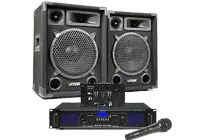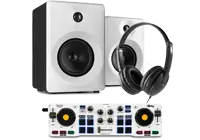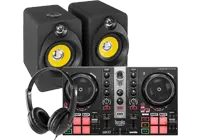For DJs who are just starting out, it can be a difficult task to get all of the essential audio equipment for events. The DJ Starter Kits that we have put together include everything you need for your audio and are suitable for smaller events in pubs for example, or medium-sized halls for larger events.
Speakers are the most essential component in a PA system. However, you need to factor in other equipment to utilise them efficiently. When using passive speakers, you will need an amplifier to power them and also to send audio to them. Our kits that include passive speakers also include a suitable amplifier to power them, which is essential for the best quality audio the speakers can achieve.
A DJ setup for beginners will usually include audio mixers. These act as a hub for any other devices you are using, for example, a laptop or DJ controller. By connecting your external devices to the mixer, you can control the volume levels of different sources all in one place, with the added bonus of EQ control, effects and crossfading that most of our mixers feature.
Different sized speakers will be suitable for different events. For example, larger, more powerful speakers will be better for larger rooms, while smaller speakers would be best suited to a small room. For advice on a starter kit for you, please contact our knowledgeable sales team to point you in the right direction.
Starting Out: The Equipment Needed for a Beginner DJ Setup
When starting out as a DJ, having the right equipment is crucial for a successful setup. Here are the popular pieces of equipment required to get started.
Speakers: Quality speakers are essential for delivering clear, powerful sound. The size and power of speakers vary significantly, so look for speakers that will match the size of your typical venues to ensure adequate sound coverage. Choose between active speakers which have an inbuilt amplifier, and passive speakers which require an external amplifier to provide power.
Amplifier: If you are using passive speakers, an amplifier is essential. Amplifiers boost the audio signal from your mixer or DJ controller to a level that can drive your speakers. When selecting an amplifier, ensure it matches the power requirements of your speakers. Our starter kits with passive speakers include an amplifier that has been chosen for its suitability.
DJ Controller: A controller combines a mixer and decks in one unit, and allows you to mix and manipulate tracks. It typically includes jog wheels, faders, knobs, and buttons that mimic traditional DJ decks and mixers. Controllers often come with software, making them a versatile tool for any DJ setup for beginners.
Audio Mixer: Some systems will include a DJ mixer rather than a controller. Mixers often include a number of useful input channels to connect your devices and a turntable if needed. There are typically adjustable volume, EQ, and effects for each channel to optimise the sound.
Speaker Stands: These position your speakers at the optimal height for sound distribution. They are adjustable and provide stability, ensuring your setup remains secure during performances.
Headphones: High-quality headphones are vital for monitoring your performance. Look for headphones with good noise isolation, comfortable padding, and a durable design.
Microphone: A microphone is a valuable addition for DJs who want to engage with their audience or make announcements.
Tips for Using Your DJ Starter Kit
Getting started with your DJ starter kit is exciting but can feel overwhelming. Here are some tips to help you get the most out of your DJ Setup For Beginners and ensure an enjoyable experience.
strong>Understanding Your Equipment: The controller or mixer is the heart of any DJ setup for beginners. Familiarise yourself with the basic functions, such as the crossfader, EQ controls, and channel faders. These elements are crucial for blending tracks and creating a dynamic set.
strong>Speaker Placement: Proper speaker placement can greatly enhance your sound quality. Ensure that your speakers are at ear level and positioned at an angle to cover your listening area adequately. Avoid placing them too close to walls to prevent bass buildup, which can muddy the sound.
strong>Building Your Music Library: Make sure to organise your music library in a logical way, for instance by artist, genre, BPM (beats per minute), and key. This organisation will help you quickly find the right tracks, allowing for smooth transitions.
strong>Practice Makes Perfect: Spend time practising your mixing skills. Start with simple transitions between tracks, then gradually incorporate more complex techniques such as beatmatching and scratching. The more you practice, the more confident you will become.
strong>Lighting and Effects: Integrate DJ lighting and effects equipment, such as smoke machines into your performance. Choose lighting effects that can sync in time to the music to create an engaging experience for your audience.
strong>Reading the Crowd: Pay attention to your audience’s reactions and adjust your set accordingly. If a particular genre or track is getting a good response, consider playing more of that style. A good DJ can adapt to the crowd and keep the energy high.
Choosing a DJ Starter Kit
To find the best starter package for your needs first consider your specific requirements. Begin by thinking about your skill level and goals to ensure the kit is tailored to your level, and look for user-friendly interfaces and essential features.
Also consider the equipment that you would like to be included, as this varies between kits to meet different needs. For instance, some kits include useful extras, such as headphones, a microphone and speaker stands. Pay particular attention to the included DJ controller or mixer, as this will be the heart of your setup. Make sure that it includes all the features that you require, for instance, jog wheels and crossfader controls, and check if DJ software is included.
Additionally, think about the size and power of the speakers needed. For instance, if you are looking to hone your skills at home, a small pair of compact speakers would be sufficient. Alternatively, if you are preparing to perform in a venue, larger, more powerful speakers will be required.
Lastly, consider the potential for future expansion and compatibility with other devices and software, ensuring the equipment can be easily upgraded as you progress. By carefully evaluating these factors, you can find a kit that sets the foundation for your DJing success.






